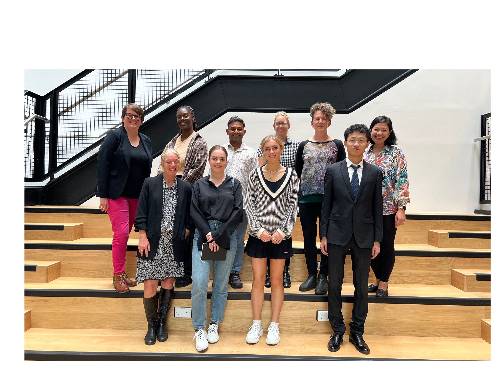
Three undergraduates successfully completed small climate change projects as part of the Tyndall Manchester - Conlan Impact Internships Programme
4 October 2022
The Conlan internships returned this summer with three undergraduate students being selected to research a range of topics whilst working alongside and being supervised by members of the Tyndall Manchester team.

The scheme is funded by a generous donation to Tyndall Manchester from Helena Conlan, in memory of her late husband Kieran Conlan, who was a water industry professional.
Jinhong Li carried out research into ‘understanding the carbon impact of cars in neighbourhoods’ and was supervised by Angela Mae Minas and Sarah Mander. Trudy Asumadu undertook research centred around ‘developing metrics to assess the resilience of UK electricity networks to the impacts of climate change’ and was supervised by Jaise Kuriakose and Ruth Wood. Cai Rees was supervised by James Mason, Branwen Tomos and Alex Gallego Schmid and undertook research looking into ‘quantifying the CO2 rebound effect from reducing speeds in the shipping sector’.
- Understanding the carbon impact of travel supports Tyndall-CAST’s research on civil society-led transformations, and takes off from lessons learned in Sarah Mander and Angela Minas’ impact project with Our Streets Chorlton – a community-led initiative which aims to co-create solutions for reducing car use for short journeys. Our intern, Jinhong Li, from civil engineering developed a proposed method for measuring the carbon impact of active travel based on his review of existing tools and best practices from academic and non-academic sources. The proposed method embeds the Department for Transport’s Active Mode Appraisal Toolkit, and provides results in terms of overall carbon impact, related health and economic benefits, and qualitative insights from active travel experience.
- Trudy’s internship project was to review academic and grey literature to identify suitable metrics for assessing the resilience of Great Britain’s electricity networks against the impacts of climate change. The detailed review of climate change adaptation measures considered by the network operators and resilience metrics will feed into the Climate services for a Net Zero resilient world (CS-N0W) project funded by the Department for Business, Energy and Industrial Strategy (BEIS).
- Cai Rees from the Department of Physics and Astronomy undertook an 8-week internship that investigated the feasibility of reducing shipping speeds to tackle emissions in the shipping sector. By developing a computational model that integrated the latest AIS shipping data, the internship demonstrated that the sector can cut carbon by 18% from an 11% reduction in average shipping speeds. The results criticise a widely held perspective in the industry that assumes carbon savings from slowing down are largely offset by an increase in the number of ships to maintain demand.Therefore, the results highlight speed reduction as a critical measure that is available for immediate implementation to reduce growing carbon emissions in the sector.
The 2022 internships culminated in a research showcase session that was attended by Helena Conlan and her daughters Georgie and Monique. The event gave the interns a chance to present the work they had undertaken and gave the Conlan family an opportunity to ask questions and find out more about the research that had taken place. The family were really pleased and impressed to see what had been achieved in such a short space of time.
The Conlan internships scheme will return in 2023 for the final round of studentships.
